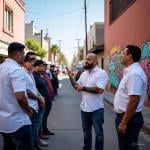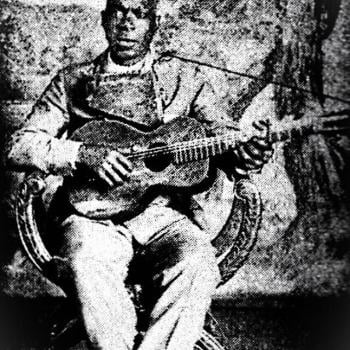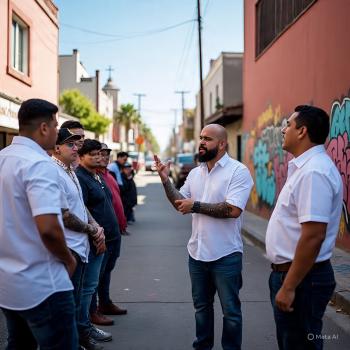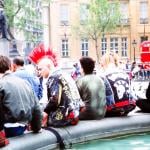Glenn Schwartz (guitar) held the mantle of becoming the “White Jimi Hendrix.” Throughout his performing career, Glenn Schwartz performed with Led Zeppelin, Eric Clapton, the Allman Brothers, Jimmy Page, and Fleetwood Mac. His technique showed no limits. His creativity flirted with brilliance. His devotion to his faith equally held no bounds. Glenn Schwartz suffered at the hands of his faith, relying on a corrupt pseudo-pastor’s practices, which subjected Glenn Schwartz to physical punishment to learn how to serve God. Through these man-made trials, Glenn Schwartz never abandoned his faith in what he believed in Christ. His unexplainable obsession with sharing the gospel and his passion for deepening his understanding of its importance in his life pushed him away from music opportunities, which he would later in life return to, but with humble resolution. The confusion most see in the life and legacy of Glenn Schwartz comes from an inability to see the trajectory of his life through his faith-filled eyes. His conversion was immediate, his evangelistic charisma was robust, and his blind passion to serve God with his gift of music was his downfall. Yet, in the end, Glenn Schwartz would arrive at a simple location where he could express his gift from God of music while never giving up the mantle or opportunity to share the gospel, even in the middle of a musical set.

“Who?” A Complicated Life
To say Glenn Schwartz was typical would neglect his upbringing as a child guitar prodigy, which continued to push him into various limelights in his unsteady musical career. His natural guitar flair was unquestionable. His appearance was captivating. His mannerisms were both polite and cordial and unexpected.
“Glenn participated in everything that life in an up-and-coming band had to offer, including the sex and drugs. But like many young people at the time, he also began to explore different spiritual paths – Hare Krishna and Transcendental Meditation. He gave up eating meat for a while, though his spiritual quest never put a stop to the more carnal activities on offer to the band” (Stevenson, Jeff. Louder, Classic Rock, August 26).
Glenn Schwartz found his niche, his calling, and with it came all the lust and carnality, lined with promises of fame. His prolific talent fed the machine designed to cultivate and exploit such gifts. Glenn Schwartz was known for being a kind person, family-centered, funny, and with a firm character.
“To the outside world, Glenn had it all. He was the hotshot guitarist in a band tipped for national success – he’d even been nicknamed “the white Hendrix” in local circles. Yet despite the attention and acclaim, there was a growing emptiness in his life, a nagging spiritual void that he couldn’t fill” (Stevenson, Jeff. Louder, Classic Rock, August 26).
Looking To Scripture To Find Answers
A sermon presented by Dr. Pastor Timothy Keller, “Jesus Our King,” of the Presbyterian Church in New York, on December 12, 1993, shares an insight that provides a reading of why Glenn Schwartz went too far in his searching for Christ which, eventually, led to his musical career destruction, almost cultural ostracising, and being labled “insane.”
Reposted in “Gospel In Life” (September 3, 2025), Dr. Keller analyzes Psalm 2 and contextualizes Jesus as our king, and how we, as humans, endure a relationship with Christ. In Psalm 2, Dr. Keller points out the greater King, Christ, and what the Psalm tells us about how we progress through three levels to establish our relationship with Christ. First, we have a true king, Jesus. Second, humans hate the king. We push away the king to lean on our own life, understanding, practices, and desires. The last point states that we needed the king. Going through these three levels, we mature in our relationship with Christ. Absent of these three levels, we wander through our days without direction. Yet, this stretching of our understanding of Christ and our ultimate relationship with Christ is the process of our life.
Glenn Schwartz used his musical gift to evangelise and share this exploration of a relationship with Christ that Dr. Keller notes through his analysis of Psalm 2. Where Glenn Schwartz rejected a relationship with Christ, he elected to follow Eastern religion and yoga. This allowed him to indulge in the vices of the music scene while searching for what would complete his life. Glenn Schwartz was instinctively aware of the need for salvation, but turned toward the available lifestyle of the music scene to hold center stage. It was in this capacity that, as Dr. Keller noted, Glenn Schwartz frames his internal hatred for a savior. Dr. Keller defines this “hatred” as a means where we, as humans with a memory trace, need to have and follow a king, that we turn to our individual ideals, fantasies, and desires rather than putting faith, trust, belief, and acceptance in the highest king, Christ. Glenn Schwartz localized his hatred of the king through a commitment to the multiple layers of a carnal life supported by the music industry. Eventually, Glenn Schwartz would arrive at the last step Dr. Keller outlines, the need for a king. Arriving at this point in his life, Glenn Schwartz would develop a loving relationship with Christ, but he turned to a false spiritual leader who gave him the opportunity to explore his path toward personal salvation.
Glenn Schwartz conducted and walked through each of these levels in his life. His unsettled, blurry life at the end of the 1960s left him seeking what he was not sure was readily available. It would be some time in the near future when Glenn Schwartz would arrive at his moment of salvation, which eventually led to his fall from Rock fame, as he found a growing obsessive desire to give his life to Christ.
In a conversation with Louder, Glenn Schwartz’s friend, Ramona Shay stated,
“Glenn’s developing spiritual interests in yoga and Eastern Indian religious practices had been replaced with one that focused on the Bible. He told me later that he was feeling troubled much of the time, and I sensed he had become ungrounded mentally and physically. The music business in Hollywood was a pretty harsh, heartless, and competitive scene, and I think the lifestyle was beginning to eat away at the sense of peace and love and balance Glenn had once had” (Ramona Shay qtd. in Louder, Classic Rock, August 26).
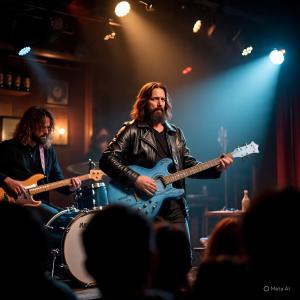
Walking Into Faith
It was in the summer of 1968 when, during a walk on the Sunset Strip in Hollywood, California, Glenn Schwartz had his personal transformation.
“In the summer of 1968, Glenn strolled onto the Sunset Strip in Los Angeles and stopped next to a group of people listening to a pavement evangelist. The preacher talked about forgiveness, love, and the chance for a clean slate – about being born again. It made perfect sense. Stoned or not, at that precise moment Schwartz chose Christ and quenched his spiritual thirst” (Stevenson, Jeff. Louder, Classic Rock, August 26).
It can be argued, this was the moment when Glenn Schwartz crossed from his hatred of a king and the realization of a need for a king.
“I was finally blessed by mercy, for I heard the Gospel of Christ on Sunset Strip as a man of God preached Christ with tears in his eyes, […] Soon my tears joined his as he gave the invitation to pray, to come forward from the crowd, to accept Jesus, and I did so,” Glenn Schwartz told Ramona Shay about this moment (Ramona Shay qtd. in Louder, Classic Rock, August 26).
This newfound passion for Christ began to immediately tear at his spirit. He realized the music he was playing was “idolatrous.” The entire context worked against what he now believed to be his calling. Glenn Schwartz was not silent about his conversion nor his evangelism. Each moment, as a performer or family man, was filled with sharing the gospel. At the same time, his bandmates, at this time in the Pacific Gas & Electric Company, knew they had limited time working with Glenn Schwartz. PG & E Co. quickly released a formidable funk, rock, and pop album, Get It On. Each band member was allowed to supply a statement printed on the album. Glenn Schwartz’s contribution read, “Together we can make everything all [right], if you just clear your mind and let your heart be your guide. Pray for peace, and may the good Lord Jesus be with you all” (Pacific Gas & Electric Co., Get It On, 1968).
Moving To Find Christ, Losing The Man Within
Larry Hill came into the life of Glenn Schwartz at a time when he was pushing the envelope of what was acceptable evangelism while playing with a secular rock band. Handing out Bibles, evangelising, and preaching to audience attendees, Glenn Schwartz had already crossed a line with Pacific Gas & Electric Co., but continued to perform with the band. Larry Hill, a strong, crippled self-defined preacher and prophet, started the Church Of The Risen Christ on the Fortney Road Farm. Incorporating a firm “turn or burn” protocol with daily corporal punishment, forced fasting, long working hours in the local community, hours of bible study, and little sleep, the small group of 50 men, women, and children who moved to Fortney Road were the center of this forming cult.
Larry Hill started a small band with the members of the cult, “Preacher And The Witness.” This group later changed its name to “The All Saved Freak Band” due in large part because the members were ex-hippies and drug addicts who came to clean up their lives through Christ. The band was filled with freaks in need of saving.
Glenn Schwartz was playing weekly gigs at a bar in Cleveland Heights named “Faragher’s” as part of the Schwartz Brothers with his brother Gene Schwartz. It was at one of these gigs that Larry Hill was introduced to Glenn Schwartz. Larry Hill was accompanied by Joe Markko, who would later invite Glenn Schwartz to attend the Fortney Road Farm. Short visits began to yield to the eventual move full-time, in the later part of 1971, to the Fortney Road Farm and performing with the All Saved Freak Band.
Knowing the talent in his possession, Larry Hill began to feature Glenn Schwartz in the All Saved Freak Band. Larry Hill kept a firm grip on all activities on Fortney Road, but Glenn Schwartz was allowed to play his guitar as part of the All Saved Freak Band. He was displayed as a saved soul who could have had a thriving career in music, but gave his life to Jesus. The guitar style of Glenn Schwartz at this time was more subdued, muted, controlled, in stark contrast to his earlier fiery, blues-lined guitar technique and solos. His appearance changed, his demeanor was crippled, yet he still maintained his God given gift to play music.
To qualify his dominance and superiority at Fortney Road, Glenn Schwartz, like others, was subject to daily corporal punishment, mental conditioning on his inability to satisfy God, and other harsh conditions if chores or duties were not met. Glenn Schwartz remained on Fortney Road even after the farm was raided in 1978 by police for reported crimes. Glenn Schwartz justified his physical punishment as his lack of living up to the expectation God had for him, which was communicated through Larry Hill.
In an effort to save their son, Glenn Schwartz was allowed a rare dinner with his family on his birthday. At this event, the family kidnapped him, put him in a hotel for days to work with a paid consultant known for cult conversion therapy.
“My son’s mind has been broken down by that man,” Glenn’s mother insisted. “Larry Hill wanted him for his guitar talent. We will continue to try to get him back” (Glenn Schwartz’s mother, qtd. in Louder, Classic Rock, August 26).
Once his family and the consultant agreed Glenn Schwartz was well enough to leave, he returned to Fortney Road. Following the 1978 raid, only a small group of individuals remained at Fortney Road Farm. Larry Hill went into hiding in Pennsylvania.
Glenn Schwartz only left Fortney Road once he realized he would never live up to God’s expectations of his life, nor those imposed by Larry Hill. Glenn Schwartz had seen his faith pushed to limits very few have had to endure. In all the abuse and exploitation, Glenn Schwartz retained his inner faith. The experience at Fortney Road brought Glenn Schwartz closer to his personal relationship with Christ. When asked about this point in time and his rationale for staying, he continues to paint Fortney Road in a positive light and does not pass a harsh word against Larry Hill.
Glenn Schwartz could not see what others saw in Larry Hill, a pseudo-pastor, a con man, an opportunist who thrived on what Glenn Schwartz was able to provide, a crowd-chilling, desirable music portrait in every concert. Larry Hill worked diligently to brainwash those in his congregation. Glenn Schwartz may have appeared on the surface to be brainwashed, but his inner quest to remain dedicated to Christ superseded those of his external environment. It’s no coincidence that the second album by the All Saved Freak Band is called Brainwashed. The final album, which included Glenn Schwartz by the All Saved Freak Band, was the uneventful For Christians, Elves And Lovers. The band did release a fourth album, Sower, which was a compilation of tracks recorded earlier when the band was together.
After the fall of Fortney Road Farm and Glenn Schwartz’s return to Ohio, he would never speak the name of Larry Hill in public. He would refer to Larry Hill as “the one-legged preacher” or the “Preacher Man” or “the Dark Man” (qtd. in Louder, Classic Rock, August 26). Glenn Schwartz was conscious of the terrible conditions and abuses that took place at the Fortney Road Farm. Still, he looked to these harsh conditions as a way to see the depth of his faith. He lived under the condition of fear, which is what kept Glenn Schwartz at Fourtney Road until he knew he could no longer sustain the persecution he was told to endure to prove his faith. Though Glenn Schwartz strived to stay to the end, he came to his physical and mental limits, which prompted his leave of Fourtney Road.

Life Verse In Music
Citing Proverbs 9:10, Glenn Schwartz notes his fear, both of the physical conditions at Fourtney Road and of God, as the beginning of his wisdom and submission to God.
Fear of the LORD is the foundation of wisdom. Knowledge of the Holy One results in good judgment (Proverbs 9:10, NLT).
Going further in the application of this proverb to the life and legacy of Glenn Schwartz, we can read that it was his knowledge and good judgment, founded on his fear of the Lord, which gave him the ability to leave Fourtney Road. Glenn Schwartz may not have felt as though he had completed what God had given him to endure. But his inner strength in faith and trust in God kept him alive during insurmountable conditions.
If we return to see how Psalm 2 aligns with the arc of Glenn Schwartz’s life and legacy, we can see that the adversity which he endured was followed by the growing depth of his faith.
“Yet I have set My King, On My holy hill of Zion” (Psalm 2:6, NKJV).
Glenn Schwartz was able to be released from his self-induced craving for earthly rewards and personal gain, which the music industry would happily have provided. Glenn Schwartz was to see his need for a king, Christ, and allow that to be his motivating focus.
“I will declare the decree: The LORD has said to Me, ‘Your are My Son, Today I have begotten You. Ask of Me, and I will give You The nations for Your inheritance, And the ends of the earth for Your possession” (Psalm 2:7-9, NKJV).
This articulates how Glenn Schwartz was able to maintain his gift of music while being punished and forced to adhere to a “turn or burn” doctrine. Glenn Schwartz used what time he had as a performer, even in the depths of pain and mental trauma, as praise.
“Serve the LORD with fear, And rejoice with trembling” (Psalm 2:11, NKJV).
The analysis provided by Dr. Tim Keller of Psalm 2 works through the application and legacy of the music provided to the world by Glenn Schwartz. Though authors have a difficult time understanding his unwavering desire and obsession with serving Christ, noting his fear of the Lord as his first steps toward wisdom and submission, when we read Psalm 2 in company with Glenn Schwartz’s life verse of Proverbs 9:10, an understanding of what Glenn Schwartz had arrived at in his life may come into focus. Glenn Schwartz moved from the knowledge of a king, the denial of submission to a king, to come at the realization of the need for a king. It is the fear, the reverence, the full submission to a King, Christ, which Glenn Schwartz manifests in his gift of music. He may have selected unorthodox moments to share the gospel and his passion for Christ. But for him, as with other evangelists, there is no better time than the present. Glenn Schwartz was to use the different platforms and performing stages he was provided to give praise through his music and share the gospel through his words. Glenn Schwartz lived, as odd as it was to those around him, the bonding agents of Psalm 2 and Proverbs 9:10.
Never A Final Guitar Solo
Glenn Schwartz literally walked back into the company of his family and friends after walking off Fourtney Road. He would later be asked to perform on a tour working with the Eagles, a short reunion with Pacific Gas & Electric Co. Glenn Schwartz returned to meager performing in the Ohio area with his brother Gene, and playing in pick-up bands as needed. His passion for Christ had not succumbed or weakened as he aged. Many believed the time he spent on Fourtney Road had brought him to insanity. From his perspective, Glenn Schwartz sees the depth of his faith as foundational.
Glenn Schwartz continued to share the gospel every chance he got, even while performing on stage, as he did in his early years. As others had noted, his mind, to some, may have weakened, but his musical ability continued to mature. Glenn Swartz died in 2018.
The Works Of Glenn Schwartz
This short video, Glenn Schwartz NEWS, posted August 2009, presents a short overview of the work of Glenn Schwartz up to 2009. The short comments give an overview of his important band collaborations.
“Glenn Schwartz, an amazing guitarist first for the James Gang (Joe Walsh took his place when he left the band in 1969), then Pacific, Gas and Electric, here performs “Daughter of Zion” with the All Saved Freak Band.”
The last slide in this video notes that Glenn Schwartz had stopped performing and playing in 2009. This is a false report. Glenn Schwartz continued to play local clubs in the Ohio area for years after 2009.
Then, there’s this example of Glenn Schwartz’s work.
The comments here point to why some took to the work of Glenn Schwartz and why others did not.
“There is no reason why this guy isn’t playing arena-sized stages. Oh, wait, yes, there is — he is certifiably insane.”
This coincides with Glenn Schwartz’s inner rebellion and absolute abandonment of personal life toward faith, which was ultimately the wrong path to endure. It was not seeking solace and giving one’s life to Christ that was the issue. It was, for Glenn Schwartz, the choice of a leader to follow in seeking to obtain a higher personal relationship with Christ.
In this live example, the elder Glenn Schwartz profiles his exemplary blues guitar technique. The concluding moments of the work are of note. This is where Glenn Schwartz returns to his evangelism. A brief capture of his words contextualizes the fluidity that Glenn Schwartz expressed early in his career, which led to his leaving his earlier collaborations and eventually seeking refuge as part of the All Saved Freaks Band. It was in this capacity that those from the secular music community labeled Glenn Schwartz “insane.”
This live selection shows the elder Glenn Schwartz and how sharp, creative, and broad his talent remained. The concluding moments are of particular note as an example of how Glenn Schwartz would fluidly move into evangelism to the audience.



